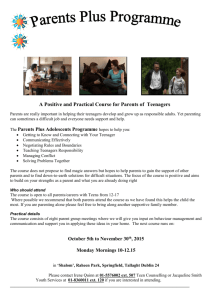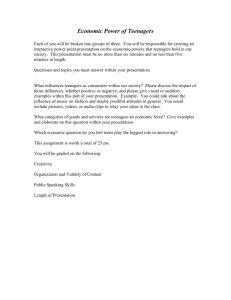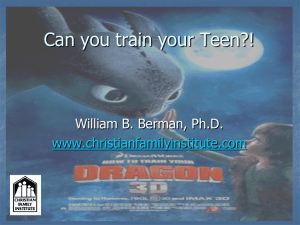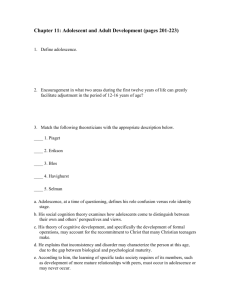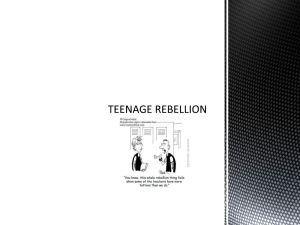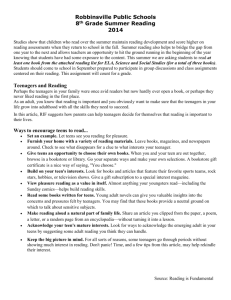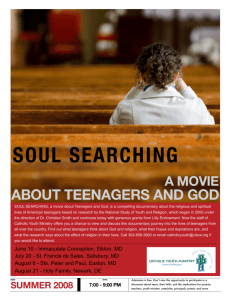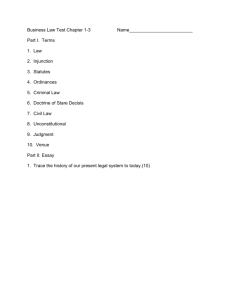2013 raise Teens CRCC berman
advertisement
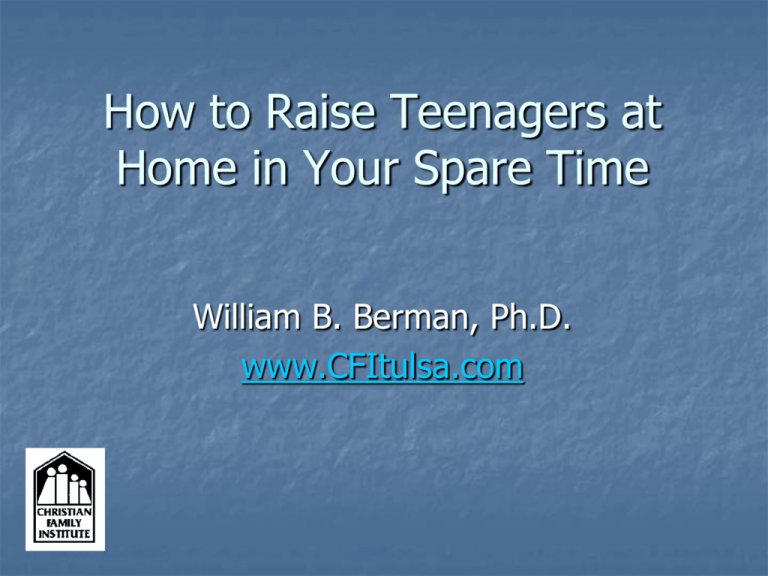
How to Raise Teenagers at Home in Your Spare Time William B. Berman, Ph.D. www.CFItulsa.com What does the Bible say about adolescents? Exodus 20:13 "Thou shalt not kill.“ 1Thes 3:4 “it came to pass” Hebrews 12:11 “No discipline seems pleasant at the time, but painful later on, however, it produces a harvest of righteousness and peace for those who are trained by it” Proverbs 22:6 Train up a child in the way he should go: and when he is old he will not depart from it. 2 Peter 3:8 But do not forget this one thing, dear friend with the Lord a day is like a thousand years and a thousand years are like a day. ADOLESCENCE A CULTURAL AND HISTORICAL PERSPECTIVE A culturally determined phenomenon (Not Universal) Invented in 1899 by the State of Illinois Legislature passed the first law in the US defining children under 16 as being subject to a different set of laws Teens were no longer subject to the adult criminal code Teens had their own set of new laws called "status offenses“ A status offense is a law that you outgrow at "age of majority“ (e.g., purchase of tobacco, fire arms, or alcohol, curfews, etc.) In effect, teens were no longer expected to act like adults Adolescent Brain Human Brain 90%– 95% of it’s final size by age 6 - 7 years By age 12, it is fully grown But, it is not fully developed until mid 20’s Female brain grows about 1-2 years faster during adolescence Functional MRI (fMRI) Studies In children, most active region is midbrain In adults, most active region is Frontal cortex (prefrontal cortex is much larger in the human brain than in any other animal) During adolescence, a gradual shift from midbrain to frontal cortex activity Frontal Cortex Changes in Brain Functioning that Begin During Adolescence UNFORTUNATLY, social maturity, impulse control, skills in managing emotions, and the ability to delay gratification develop at a much slower pace AND, hormone levels surge SO, we see increases in risk taking; decisions without consideration of long term consequences; and peer pressure influences Ready --- Fire --- AIM Changes in Brain Functioning that Begin During Adolescence Once this brain transformation is completed by mid-20’s: Foresight (anticipation of what will happen if…) factors into decision making and hindsight (learn from mistakes) no longer the dominant factor Reprocess past decision with new brain “WHAT WAS I THINKING!?” Discover that parents made their decision with this new brain that we now use to make decision about our children (remember Proverbs 22:6) 1969 1972 Rules v. Wishes Rule A command with a mandatory consequences for noncompliance Wish A hope with no consequence for nonfulfillment REMEMBER: Teenagers obey rules Teenagers do not grant wishes Parenting Teenagers 101 1. Encourage and affirm Resist invoking “parent’s curse” Let them know that you didn’t understand the wisdom behind your parents rules either, until you became an adult yourself 2. Teach and practice effective communication Speaker-Listener technique 3. Time Out (stop the avalanche) By mutual agreement Use humor Parenting Teenagers 101 4. Understand their struggle (They won't!) Identity Inadequacy Conformity Role confusion Puberty starts early and must delay marriage longer in our culture Sexuality Temptation Approach-Avoidance about becoming a responsible adult (Peter Pan) 5. Tough Love Very tough Very loving Parenting Teenagers 101 6. Rules - Relationship = Rebellion 7. Exercise authority (benevolent dictatorship) But as surely as God is faithful our message to you is not “yes” and “no” 2 Cor 1:18 Above all, my brothers and sisters, do not swear – not by heaven or by earth or by anything else. All you need to say is a simple “yes or “no”; otherwise, you will be condemned James 5:12 All you need to say is simply “yes” or “no”; anything beyond this comes from the evil one. Matt 5:37 8. Accountability 9. Fairness Teen takes risk, parent suffers consequence? 10. Effective consequences Effective Consequences No discipline seems pleasant at the time, but painful. Later on, however, it produces a harvest of righteousness and peace for those who have been trained by it. NIV Heb 12:11 The least averse consequence that works is the most aversive consequence you need to use Contingency reinforcement (Grandma’s Rule) If the consequence doesn’t work then it must be increased There is no need for “verbal overkill” Your teenager then has only 2 choices: surrender the easy way or surrender the hard way
